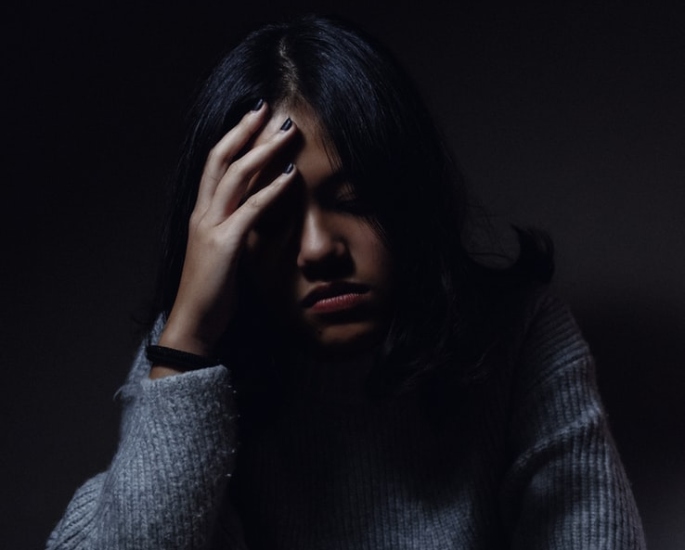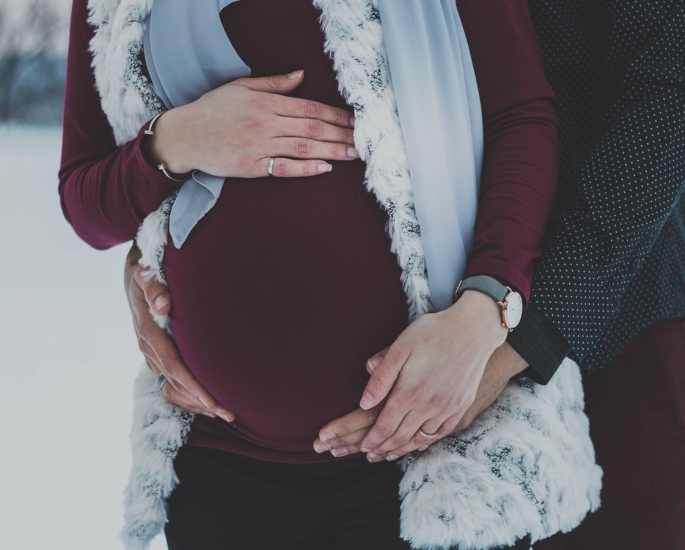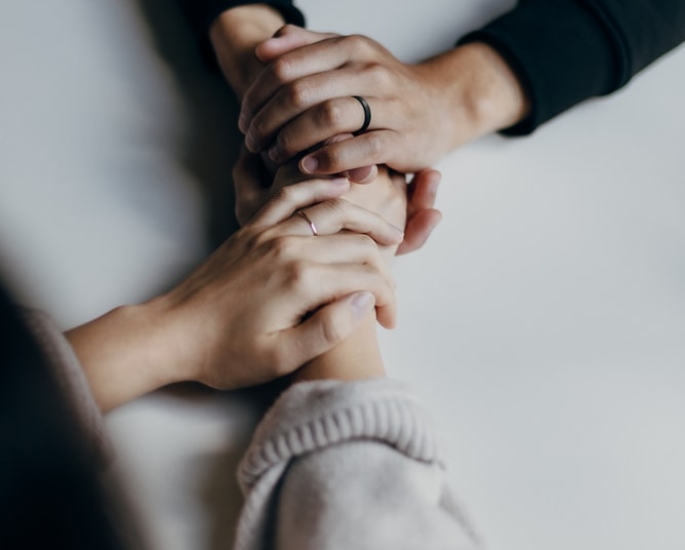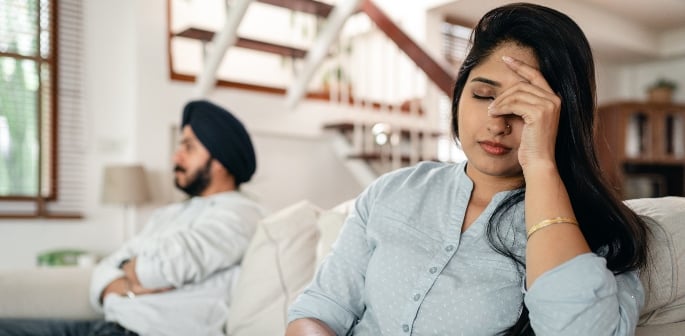"I felt numb by the knowledge of what could have been."
Miscarriages are more common than most people realise, including in the South Asian community.
It is estimated about 1 in 8 pregnancies will end in miscarriage.
A miscarriage can be an emotionally and physically draining experience for women. Therefore, it is important to give time for mourning and healing.
Women may have feelings of shock, anger and guilt. This is even though the majority of miscarriages are not caused by anything the mother has done.
So then, why are Desi women not provided empathy and support? Why are they told to “stay positive” and to “just try for another one”?
In many desi homes, women are the carriers of the blame for any tragedy during a marriage. In part, this is due to patriarchal Desi cultures where men are superior and superstitions prevail.
Thus, many Desi women choose not to openly discuss their loss. They grieve in silence.
Some Desi women fear sharing the bad news with family and friends. They often do not want to be blamed or judged for their habits during pregnancy.
However, this sadly leads to women contending with the physical and mental pain by themselves.
A loss of hopes and dreams can happen after miscarriages according to the Miscarriage Association. Support is needed, yet couples can be too afraid to mourn outwardly.
How can we as a society encourage compassion and give people time to grieve and mourn without judgement?
The Importance of Grieving

Expectant parents are likely to become excited upon pregnancy confirmation. They begin to visualise what their future will look like now they are having a baby.
Therefore, it is important to grieve a miscarriage because of lost hopes and dreams.
After suffering the loss of a baby, it takes weeks for a woman’s body to recover. Furthermore, one’s emotions are bound to also be in turmoil.
Doctors and midwives may focus on the physical aspects of the loss but may refrain from the emotional side.
Nonetheless, it is important to grieve as the pain of bereavement can make you feel isolated.
Many have found that talking with friends and family has shown that you are not alone. Others around you may have suffered a similar loss.
Shock, grief, depression, fatigue, and a sense of failure are all understandable feelings.
It may seem that everything you had dreamed of has been taken away. People need time to mourn in terms of what could have been to progress.
Grieving is not forgetting. Nor is it drowning in tears.
Healthy grieving helps remember the importance of the loss—but with a newfound sense of peace, rather than searing pain that expectant parents may suffer.
Everyone experiences this mourning process differently. DESIblitz spoke to two women who shared their individual experiences with us.
Farah Malik

Farah Malik* is a 29-year-old receptionist from Manchester. In late 2019, she fell pregnant with her third child and was delighted.
Both she and her husband worked full time to afford their familial costs.
However, Farah’s in-laws did not quite understand this and felt she should be at home, not lifting a finger during pregnancy.
It is therefore understandable to see why Farah felt shamed by outsiders when she suffered a miscarriage. She recalls her initial apprehensions:
“At first, I did not want to tell anyone. They thought I was doing too much, working five days a week.
“It was guilt because I already have two beautiful kids. I was worried they would brush my pain off because I’ve already got what I’ve always wanted – why push it?”
When Farah lost her third child, she didn’t even tell her friends for a while:
“I thought I would be burdening my loved ones with my grief.”
Though, keeping her true feelings inside meant she went into a really dark place. Soon, Farah became depressed and struggled to perform everyday tasks:
“My husband basically forced me to see a doctor – it was the best decision.
“I still have flashbacks of the moment I lost my baby.”
Although, Farah feels she copes much better now. It is clear that talking about the loss and seeking medical advice had helped heal Farah.
Her only wish? In hindsight, Farah says she would have not bottled up her emotions.
Instead, she thinks speaking with others who had gone through similar situations would have helped her process her feelings quicker.
Shanta Chowdhury

Shanta Chowdhury*, a 27-year-old counsellor from Greater London experienced a miscarriage with her first pregnancy.
After the first trimester, Shanta told everyone she was pregnant, ensuring they were in the “safe zone.”
Yet, at a scan a week later, the doctor found a chromosomal condition. Soon after this led to her miscarriage.
Shanta was left devastated as she expressed:
“Even though I am a counsellor, no amount of training could have prepared me for it.
“We just did not expect it and we had told everyone.”
However, instead of suffering in silence, Shanta decided to announce the loss just as publicly as she announced her joy.
Fortunately, this truly helped her mourn as the support she received was overwhelming:
“Less than ten minutes after posting about our loss, a colleague called me. I never knew about her own miscarriage. She told me that you realise lots of people are in the same club.”
Being open about her loss meant that she became closer to people:
“I was in my own little world before my miscarriage but I have become a better listener.
“I am a much more empathetic person now.”
What got Shanta through was knowing that she was not alone in her mourning.
In addition, it provided some comfort knowing that while she would never forget, she would heal and perhaps even go on to have another baby.
Allowing Men to Grieve Miscarriages

It is important to understand how miscarriages affect men too.
In Desi cultures, many stay silent about miscarriages or gloss over feelings. They do this by encouraging people to “just pray” or “be positive.”
Unfortunately, this sends a message that sufferers should not speak. This need to display a strong exterior is felt strongly by many men, given the notion of toxic masculinity.
However, it is paramount that men are equally allowed to mourn without hiding. Shiv Nahar, a 32-year-old consultant from Glasgow mentioned his challenges as the man:
“It was hard to watch my wife suffer so much. I couldn’t do anything to help her.
“It’s challenging to be the man – I wanted to be strong for her but I also was frustrated and upset.”
Where to find support:
- The Miscarriage Association supports people who have lost a baby. They have a helpline (01924 200 799).
- The Compassionate Friends Network is a support group for grieving your child.
- Cruse Bereavement Care helps people understand their grief and cope with loss.
- sayinggoodbye.org also provides bereavement care.
- Willow’s Rainbow Box aims to support women and families experiencing pregnancy, following a loss through miscarriage, stillbirth or neonatal death.
“I felt numb by the knowledge of what could have been.”
While men do not experience the hormonal changes or the physical reality of the pregnancy, they still suffer a loss.
Therefore, they too need to grieve to live in peace and deal with the sudden loss.
For Devinder Singh*, a 28-year-old optician from London, symbolically remembering his unborn child was helpful:
“My wife and I created a little memorial in our home. It was a piece of artwork that symbolised our loss.”
Seeing this every day for some may be an unwanted reminder. Though, for Devinder and his wife this allowed them to face their miscarriage and not shy away:
“Our child is not a hidden tragedy that we tiptoe around – the loss is part of us.”
Trying to keep a brave face at every moment can be damaging in the long term.
In being open and honest, more men can mourn as well. Finding the right support network is very beneficial.
Breaking the Culture of Silence around Miscarriages

Brushing the topic of miscarriage under the carpet in the South Asian community is very common.
Staying silent can cause short-term and long-term problems. Desi cultures often do not respond to the mental health side of miscarriages compared to the physical side.
This may make many individuals feel that they have no choice but to endure in silence.
Did Desi women eat the right food? Was she praying? Did someone curse her?
The stigma attached to miscarriages in Desi households needs to end.
Support from mental health care providers such as BetterHelp can reduce the feeling of guilt, which is something no woman needs after losing a baby.
Despite the taboo nature of miscarriages, Desi celebrities have broken this culture of silence.
For example, Pakistani actress Sana Askari spoke of her two miscarriages.
Sana said that she did not have any problems that caused her miscarriages. She refused to be blamed.
Regardless, if an individual is early or late in their pregnancy when they miscarry, they need to mourn and heal from their hopes and dreams.
Desi women must give time for mourning and healing.
Creating a safe space to grieve is crucial in eradicating the stigma associated with miscarriages, once and for all.






























































